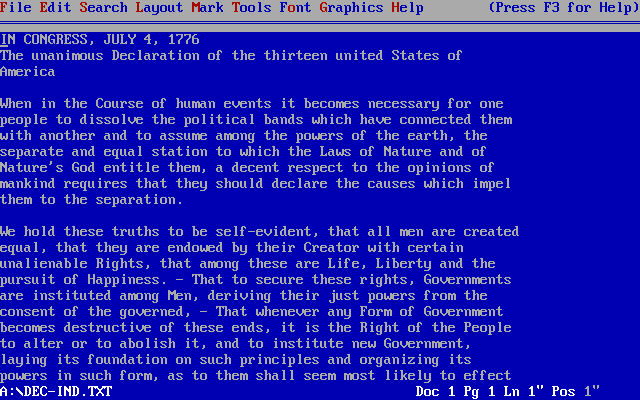WordPerfect? I used it also. Great product. Funny thing is, when Word first came out, my reaction was "A mouse to operate a word processor? That's stupid!"

Posted on 04/11/2015 11:25:09 AM PDT by Utilizer
Typically, today’s budget PCs come with 4GB of RAM. A mid-range configuration may offer double that, and high-end gaming systems and workstations go as high as 16GB or more.
There’s no doubt which way the wind’s blowing, either: Windows 8 supports up to 128GB of physical memory (assuming you’re running the 64-bit edition), while Windows 8 Pro can go up to 512GB.
Does anyone really need this much RAM? Memory isn’t as expensive as it used to be, but there’s obviously no point paying for gigabytes of RAM from which you’ll receive no material gain.
Does more equal faster?
Many people assume that adding memory makes a PC significantly faster, and in some cases it does. Sticking an extra pair of DIMMs into a motherboard won’t change the speed at which the processor executes code, but it can help in other ways, especially on older systems with 2GB of RAM or less, since adding RAM reduces the need for Windows to rely on “virtual memory”.
Simply put, virtual memory is a file on your hard disk that serves as temporary storage when your PC’s “real” memory is full. Virtual memory makes it possible, for example, to have several heavyweight applications running at once, even if they won’t fit simultaneously in RAM. When you switch from one to another, Windows quickly swaps the relevant data from the disk into real memory, which explains why the virtual memory file is sometimes called a swap file. If you’ve set Windows Explorer to show hidden files, you can see the swap file in the root directory of your system disk; depending on which version of Windows you’re using, it will be called pagefile.sys or swapfile.sys.
(Excerpt) Read more at pcauthority.com.au ...
I do mostly CAD/CAM work which is not problematic when I am working with the simple layout designs. The greatest drain appears to be when I first start working on the final stages and do a lot of rotating models in three dimensions, or stress computations and mechanical simulations.
Even running with 2GB the machine seems to be struggling a bit, but memory is not all that inexpensive yet and so far I have simply tried to be patient and accept the occasional sluggishness. Thus the current musings on whether or not to upgrade the RAM on the main machines.
WordPerfect? I used it also. Great product. Funny thing is, when Word first came out, my reaction was "A mouse to operate a word processor? That's stupid!"

But wasn’t it Bill Gates who said — 640K was all we’ll ever need?
Thanks for the advice, but in Linux the general agreement is that the swap space on the drive should be twice the size of the amount of RAM on the board. On this machine, that makes it sda6 at 4GB of hard drive space for the 2GB of RAM with both slots filled.
Exactly!
Good advice. I completely forgot about graphics memory and that I really need to start shopping around for a better card chipset. Of necessity, Linux-friendly. Rendering is quite demanding as it is on the main machines so I need to consider this a bit more.
RCA 301 my late Dad sold those for RCA back in the early 60’s . First computer to call Kennedy over Nixon.
Yep. I was using a beta version of the business version of Word Perfect. Worked like a charm on my IBM XT machine with its 40 MB hard drive. I still have WordPerfect on my machine, although I usually use Open Office.
I went from 4GB to 16GB and it was amazing the difference it makes. OSX takes 2GB on it’s own. Windows may be worse.
Minimum is 8GB these days. It’s cheap, $200. Step the processor down a notch or two but ram is the secret to ending slowdowns.
that seems excessive
There's a thought. Roughly how much would you say it increases battery life?
Linux doesn’t need as much RAM as Windows by a long shot.
According to Bill Gates, the most RAM you will ever need is 640K.
Virtual memory is when ram made a performance difference. Using a disk drive for ram overflow brings a system to it’s knees.
I have 32 gig in my pc. I do alot of virtualization though. Most people won’t need more than 8gb.
It was in defense of the early DOS, not necessarily a dogmatic statement for all time.
The first PCs were based on the Intel 8088, which was a hybrid 8/16-bit processor — thus the reason for the 640Kb memory limit. That may seem tiny compared to today, but 640Kb at that time was an order of magnitude larger than the 64Kb limit that faced users of 8-bit computers, such as the Apple II+ and the Commodore 64.
I hope you meant GB instead of MB
wow
4GB isn’t enough. 8GB minimum. I spent $100 for 16gb and never get slowdowns at all. You have Excel/Word/Access, Email, and a browser open and you are sitting at near 6GB used. Browsers and email are real hogs.
Google Chrome alone will eat up most of your RAM.
Disclaimer: Opinions posted on Free Republic are those of the individual posters and do not necessarily represent the opinion of Free Republic or its management. All materials posted herein are protected by copyright law and the exemption for fair use of copyrighted works.